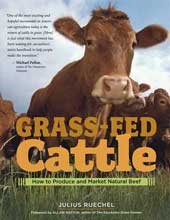Grass Fed Beef Buying Tips:
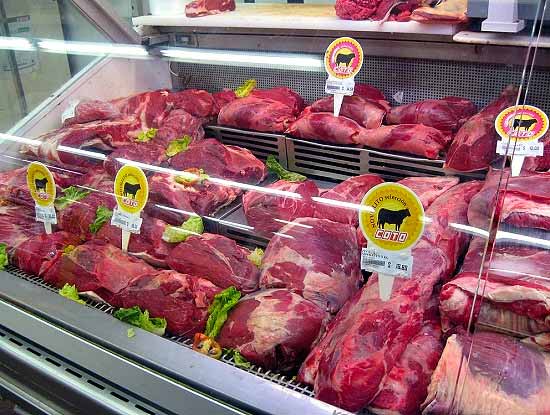
Image Credit: Christine592
If you are buying grass fed beef, ignore the current USDA beef grading system and don't worry so much about whether the beef is marbled.
The microscopic fat cells responsible for beef tenderness and flavor are not measured by the current USDA grading system. Instead the current grading system relies on a measure of the amount of visible fat streaks (marbling) in the beef. It works well for most grain fed beef, but fails when switching to grass-fed beef.
Beef marbling, which defines the grain-fed beef grading system, is often less pervasive or altogether absent in grass fed beef, even when it is just as well-finished and equally tender as its grain-fed equivalent.
Consequently, beef consumers need to learn the differences between grass fed and grain fed beef, and learn what questions to ask when setting out to buy grass fed beef.
The tips below will help you gauge tenderness and flavor in grass finished beef so you know what questions to ask your grass fed beef farmer and so you can independently judge the quality, tenderness, and flavor of the grass fed beef you are considering buying.
Start with a small sample order...
Start with a small sample order before making a large purchase from a new grass-fed beef producer - test it and trust your palate.
If it's tough, give them a second chance (even the most successful beef producers - both grain fed and grass fed - will sometimes have a tough animal that slips into the mix).
But if a producer's beef fails a second taste test then find a different grass-fed beef producer. Two strikes and they're out! But don't give up on grass-fed beef altogether just because you run into a poor quality supplier - rest assured that a skilled grass-fed beef farmer is equally capable of producing tender beef as any skilled grain-fed feedlot operation, and the flavor is even better!
Adjust your cooking technique for grass fed beef
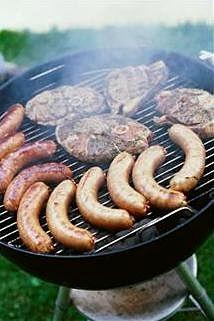
Learn how cooking grassfed beef is different than cooking grainfed beef. Grass fed beef is leaner than grain-fed beef, so turn down the heat and shorten your cooking times!
It's only a fair test if you do your part; what you do in the kitchen is just as important to preserving tenderness and flavor as all the hard work that the farmer has put in to bring you a tender, flavorful beef product.
Evaluate your farmer - ask questions!
Ask questions and learn about how the farmer is producing the beef that you are buying.
Start by reading this quick overview of the Seven Unbreakable Rules of Good Beef.
And here's a list of important questions that will help you get to know your grass fed beef farmer:
What is your farmer's slaughter season?
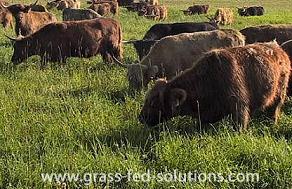
Grass finishing can only be done when the grass quality is sufficient for weight gains. Thus, since most climates are seasonal, most grass fed cattle farms cannot finish and slaughter year-round on pasture.
This does not mean that the finishing and slaughter season has to end just because the snow begins to fly. If your farmer's grass finishing season extends into the winter, find out what additional management strategies they are using to maintain continuing weight gains after the growing season ends. Weight gains right up to the slaughter date are essential for beef tenderness and flavor (see Rule # 3 of the Seven Unbreakable Rules of Producing Great Beef.
They could, for example, be using a high quality winter pasture specifically prepared for winter grazing with daily pasture moves. Or they could be grazing an annual grazing crop, such as grazing corn, which can be grazed during the winter if the corn is planted late. They can even be feeding hay or silage. As long as they are not supplementing with grain, because then it isn't really grass fed (see grass fed vs grain fed beef).
What breed(s) does your farmer use for grass finishing and what weight do the beef animals need to reach before they are slaughtered?
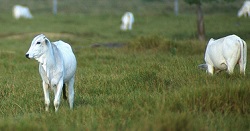
Image Credit: US Department of Agriculture

Image Credit: US Department of Agriculture
You don't need to know the answer yourself to ask your farmer this question - just look for evidence that he/she clearly knows the answer.
An Angus slaughtered around 1050-1100 pounds has reached its finished weight, but a Simmental slaughtered at the same weight will be under-finished, tough, and flavorless.
Size matters - large-framed animals take longer to finish, but will be heavier when they reach their target weight compared to smaller-framed animals. An Angus can finish as young as 16 months of age, a Simmental requires 20 to 22 months to reach their target finish weight of around 1400 pounds. The large-framed tropical breeds may require in excess of 24 months and be even heavier! A skilled grass-fed producer MUST know the ideal slaughter weight and minimum slaughter age of his/her breed or breed combinations.
Ask about your farmer's cattle supplement program...
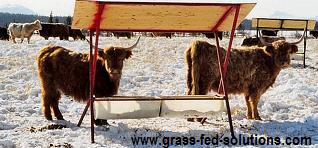
Every cattle farmer, regardless of whether the beef is grain fed or grass fed, should have a supplement program for his cattle. And it should be different for summer vs. for winter. Summer should be primarily vitamins and minerals. Winter supplementation may or may not include protein and energy supplements too. And while things like alfalfa pellets are valid nutrient supplements, it isn't grass fed beef if oats, barley, mashed corn kernels, or any other grains are included in the mix.
If your farmer doesn't have a mineral supplement program, then they are not pros!
What is your farmer's soil fertility program.
Your farmer is in the grass production business - cattle are just the tool to turn grass into a salable product. So find out what your farmer does to manage the nutrients in his/her pastures!
There isn't a single right or wrong answer to this question - it depends on the type of farming operation.
Annual soil testing in an intensive pasture program is essential, but neither fertilizer nor soil testing is feasible (or necessary) in extensive range-land operations.
Walk away and find another beef producer if a farmer with an intensive pasture program tells you they don't need a soil fertility program, or tells you they don't need to do soil tests because they just use composted manure.
Manure (composted or not) is just like any other fertilizer - if the soil does not need the specific nutrient balance within the manure compost, or if it is applied in the wrong amounts, compost and manure can be extremely damaging to the soil - and those nutrient imbalances will likely impact the nutritiousness and flavors of your beef too!
Any farmer that fertilizes - even if only with compost and manure, MUST do annual soil tests. How else is a farmer going to know if the soil needs something that isn't contained within the compost - like calcium! - which is often overlooked by inexperienced farmers that don't use proper soil tests and blindly apply compost to everything.
Get a Farm Tour!
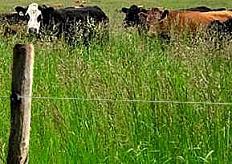
Get a tour of your farmer's beef production system, and insist that they show you their grass-finishing strategy!
Many farmers give farm tours because it's truly a 'win-win'; the consumer gets to see where their beef comes from and has a fun family outing, while the producer has a chance to truly showcase their farm and their beef product, which is one of the best ways to develop a long-term loyal relationship with their customers.
Don't be shy - ask for a tour!
Do a drive-by the farm where your beef comes from...
Do a drive by the farm and peek over the fence at times of the year when conditions are NOT easy, warm, green, or dry. Summer is a fun time to visit farms BUT that's the easy time of year when pretty much all cattle are knee deep in grass.
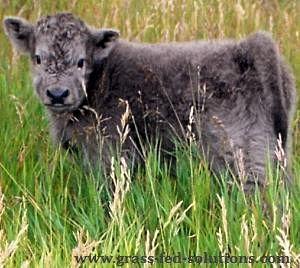
Drive by in spring during the worst of the mud season and compare how the farmer's cattle are faring compared to other farms in the area. If they are calving in spring (like most conventional beef farmers), instead of calving on pasture during the much more advantageous summer, find out why. There may be a very good reason for their choice (and there are in some cases - this is not an automatic strike-out), or they may simply be carrying on with tradition, which signals that their grass-fed beef program has not been fully thought through and designed as a seamless pasture production process!
Drive by in fall and early winter. Does their slaughter season end when the grazing season ends, or do you see cattle confined to feed pens even while their slaughter season continues? What do their pastures look like at this time of year - beef from cattle that are grazing on meager pastures is unlikely to be tender and flavorful!
Drive by in winter. If you see the cattle being fed grain,or if the cattle are supplemented with grain while still out on pasture, then it's not grass-fed beef. However, alfalfa pellets and other non-grain feed supplements or feed rations are okay as they are an essential part of most grass-fed beef producers' winter grazing or winter feed programs. In fact, if the cattle are grazing knee-deep through snow and there isn't evidence of some kind of a mineral and nutritional supplement program, then you shouldn't buy their beef, if for no other reason than that they are not doing their homework to ensure for the health and welfare of their cattle.
Any farmer that produces grass-fed beef should immediately know the answers to these questions. If they don't, or seem unsure, then they are not professionals. Move on - there are plenty of other grass fed beef producers eager for your business. You won't trust a mechanic that has trouble finding the transmission, or a doctor that has trouble pointing out where your fibula bone is located. So expect your grass-fed producer to know the how's and why's of his craft! And its a win-win scenario - by giving your farmer an opportunity to showcase their production system, they are likely gaining YOU a loyal beef customer for many many years to come!
Related Articles:
(Disclosure: I get commissions for purchases made using Amazon links in my post.) And when you're ready to start planning your cattle farm, check out my book: Grass-Fed Cattle: How to Produce and Market Natural Beef. Use the links below to explore my book and read reviews on Amazon: 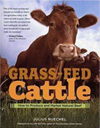
|


